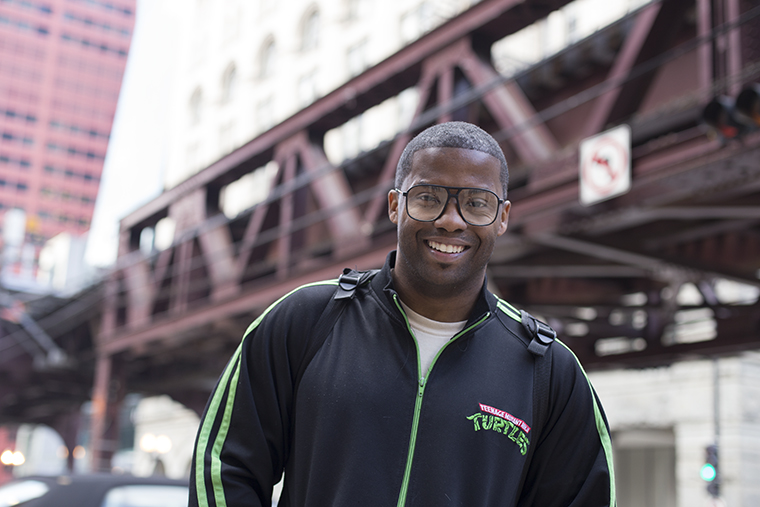‘Maek’-ing a difference
April 14, 2014
Do not let his bright smile and Teenage Mutant Ninja Turtles sweatshirt fool you, electro hip-hop artist and South Side native Jason “Maek” Sizer is not just a lyrical wordsmith. He is an entrepreneur. Sizer launched Maek, a free music label, with co-founder Tiffany Lee in September 2013. He decided music sales were an artifact of an industry that has failed to change its business model since its realization, so with just a click, fans can own music from any artists signed to Maek.
After working in the music industry as an independent contractor and ghostwriter for a few years, Sizer said he could no longer watch from the sidelines. He released his debut EP Do Epic Sh!t March 25 and dropped singles “God Made All of Us,” a sleek and sexy R&B track featuring shrieking synth strings and a pinging piano line and the bass-thumping “Ew,” in October and November, respectively. Sizer’s combination of electronica and hip-hop address sensitive social issues, with “God Made All of Us,” making a particularly big splash with its egalitarian message. However, before this emcee ever picked up the mic, his mother made sure he could play a classical instrument—the harp.
The Chronicle chatted with Sizer on the phone to discuss his label, the message behind his music and how he was tricked by the college
education system.
THE CHRONICLE: “Free-music” sounds counter-intuitive to a successful business. How do you profit?
JASON SIZER: It’s completely free; we just pretend it’s for sale. By saying that, our business model actually allows artists to make money off the larger chunks of revenue that exist outside of sale [through] product placement [and] advertising, of course merch and tours—that’s where our artists make their money.
CC: Is being involved in the creative side of music and business end liberating or restricting?
JS: I’m not one of those artists that doesn’t like both coins. It’s great knowing that you can really help build someone’s career, knowing that you can really put their dreams forward, and it’s really great to know that, as an artist, there are people who like the stuff…. I wake up every morning and it’s Maek, whether it’s me as an artist or myself as a business.
CC: What do you like to write about?
JS: I like to write something that I think people can understand or will change people’s day…. The first single that came out was “God Made All of Us,” and that steps on a lot of toes. It was removed [and] taken down twice by two different hate groups [and] we received a lot of hate mail for it.
CC: Why were some people offended by your single?
JS: When it came out, it received acclaim and criticism. I think there are people who are open to equality and that want to see liberation in people where it doesn’t matter what your sexual preference, your orientation, your gender, that we’re all equal at the end of the day. I think there are people who do believe that philosophy and there are a lot of people that don’t.
CC: How does it feel to receive criticism of your music?
JS: Not everybody is going to like your music. Whatever song is your favorite song, trust me, there’s tens of thousands or a million people that dislike it, so you’re not pleasing everybody.
CC: What does your new EP mean to you?
JS: When you were a kid, no one dreamed and said, “Hey man, I’m gonna grow up and be average.” There was no kid that had that dream. We wanted to be lawyers and doctors and writers and directors and superheroes. We wanted to do everything there was as kids, and somewhere down the line we grew up. That passion for life was rerouted because of some experience we had in life.
CC: You rapped about college holding you “hostage” on your EP. What did you mean by that?
JS: College is just a system of, “Hey, you’ve got to go to school,” and then you leave. You’re not really helped to find a place, but what you are held to six months later, [is] SallieMae and all the loans for the rest of your life.
CC: Do you feel victimized by the system?
JS: No. I think college gave me a lot of experience that I don’t think I would have under any [other] platform. I went to school [and] got my bachelor’s in political science and psychology and did my minor in urban studies. I did a master’s in urban planning; I worked on a Ph.D. in sociology. I’ve done a lot of school … I have student loans higher than most condos, but I think that when I left that college, it was a system that I bought into like the Matrix.
CC: What is your number one rule in life?
JS: “Thou shall not be a d–k.” I think that is the golden rule to life. I haven’t verified that yet, but everything I’ve done in life when it comes to karma or commandments, whatever your belief system, it’s all based on not being a d–k to other people. If you’re awesome to people, life will be awesome to you back.








